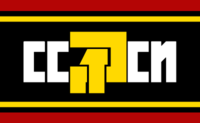Difference between revisions of "Lore Portal/Factions"
Jump to navigation
Jump to search
Sadhorizon (talk | contribs) m (fixed the issue of images touching the text (might be a bad fix tho, style-wise)) |
m (Protected "Lore Portal/Factions": Lore pages are temporarily locked down while we discuss the future of Lore. Decision made by the Heads of Staff. If you wish to add Lore, get approval and I will add it. - SynthTee ([Edit=Allow only administrators] (indefinite))) |
||
| (7 intermediate revisions by 2 users not shown) | |||
| Line 5: | Line 5: | ||
| | | Nanotrasen stands as one of the most powerful human enterprises. Its roots trace back centuries before space colonization on Earth. Founded by Jonathan N. Nexus, the megacorporation is a focal point of galactic talk, especially among humans. Its role as a de facto governing body and rumors of TSF corruption are controversial. As a corptocracy controlled by an executive board, Nanotrasen offers careers and financial benefits, while promoting its commitment to enhancing lives through innovative technologies. | ||
| Line 14: | Line 14: | ||
| | | The Syndicate is a loose band of criminal organizations, pirates, and corporate backers created in the aftermath of the Kidan war. With what started as three powerful groups of Cybersun, Gorlex, and Waffle Co. would soon expand to various other groups joining its ranks to terrorize and sabotage governments and rival megacorporation's within the spur. Today the Syndicate continues to operate in separate cells with occasional infighting from internal groups. | ||
| Line 23: | Line 23: | ||
| | | The Trans-Solar Federation, commonly referred to as "SolGov," stands as the largest human-origin government in the Galaxy. This military republic encompasses a diverse array of colonized systems within and around the [[Sol System]]. | ||
| Line 32: | Line 32: | ||
| | | Conceived in the struggle against the Trans-Solar Federations overarching and pro-corporate unity, the Union of Soviet Socialist Planets is the single largest splinter faction of humanity. Following the tenets of Malfoy Ames, the Union serves as a striking contrast to the staunch corporatism rife in human sectors. Collectivist in nature, the USSP espouses that the well-being of many is better served through collective ownership and broad governance rather than by the individual or the corporation. | ||
|- | |- | ||
|} | |} | ||
Latest revision as of 22:09, 5 September 2024
Nanotrasen
|
Nanotrasen stands as one of the most powerful human enterprises. Its roots trace back centuries before space colonization on Earth. Founded by Jonathan N. Nexus, the megacorporation is a focal point of galactic talk, especially among humans. Its role as a de facto governing body and rumors of TSF corruption are controversial. As a corptocracy controlled by an executive board, Nanotrasen offers careers and financial benefits, while promoting its commitment to enhancing lives through innovative technologies.
|
Syndicate
|
The Syndicate is a loose band of criminal organizations, pirates, and corporate backers created in the aftermath of the Kidan war. With what started as three powerful groups of Cybersun, Gorlex, and Waffle Co. would soon expand to various other groups joining its ranks to terrorize and sabotage governments and rival megacorporation's within the spur. Today the Syndicate continues to operate in separate cells with occasional infighting from internal groups.
|
SolGov
|
The Trans-Solar Federation, commonly referred to as "SolGov," stands as the largest human-origin government in the Galaxy. This military republic encompasses a diverse array of colonized systems within and around the Sol System.
|
USSP
|
Conceived in the struggle against the Trans-Solar Federations overarching and pro-corporate unity, the Union of Soviet Socialist Planets is the single largest splinter faction of humanity. Following the tenets of Malfoy Ames, the Union serves as a striking contrast to the staunch corporatism rife in human sectors. Collectivist in nature, the USSP espouses that the well-being of many is better served through collective ownership and broad governance rather than by the individual or the corporation.
|



